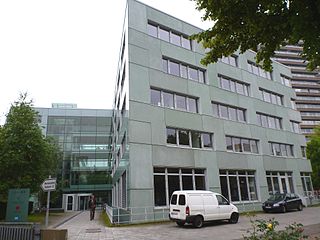
The Max Planck Society for the Advancement of Science is a formally independent non-governmental and non-profit association of German research institutes. Founded in 1911 as the Kaiser Wilhelm Society, it was renamed to the Max Planck Society in 1948 in honor of its former president, theoretical physicist Max Planck. The society is funded by the federal and state governments of Germany.

The Kaiser Wilhelm Society for the Advancement of Science was a German scientific institution established in the German Empire in 1911. Its functions were taken over by the Max Planck Society. The Kaiser Wilhelm Society was an umbrella organisation for many institutes, testing stations, and research units created under its authority.

The Max Planck Institute of Biochemistry (MPIB) is a research institute of the Max Planck Society located in Martinsried, a suburb of Munich. The institute was founded in 1973 by the merger of three formerly independent institutes: the Max Planck Institute of Biochemistry, the Max Planck Institute of Protein and Leather Research, and the Max Planck Institute of Cell Chemistry.

The Max Planck Institute for Biophysical Chemistry, also known as the Karl-Friedrich Bonhoeffer Institute, was a research institute of the Max Planck Society, located in Göttingen, Germany. On January 1, 2022, the institute merged with the Max Planck Institute for Experimental Medicine in Göttingen to form the Max Planck Institute for Multidisciplinary Sciences.
The Max-Planck-Institut für Kernphysik is a research institute in Heidelberg, Germany.

The Max Planck Institute for Molecular Biomedicine was founded on 1 April 2001 in Münster, North Rhine-Westphalia, Germany. It is part of the Max Planck Society. The current managing director is professor Dietmar Vestweber.

The Max Planck Institute for Solar System Research is a research institute in astronomy and astrophysics located in Göttingen, Germany, where it relocated in February 2014 from the nearby village of Lindau. The exploration of the Solar System is the central theme for research done at this institute.
The Max Planck Institute of Colloids and Interfaces is located in Potsdam-Golm Science Park in Golm, Potsdam, Germany. It was founded in 1990 as a successor of the Institute for Physical Chemistry and for Organic Chemistry, both in Berlin-Adlershof, and for Polymer Chemistry in Teltow. In 1999, it transferred to newly constructed extension facilities in Golm. It is one of 80 institutes in the Max Planck Society (Max-Planck-Gesellschaft).
The Max Planck Institute for Dynamics and Self-Organization in Göttingen, Germany, is a research institute for investigations of complex non-equilibrium systems, particularly in physics and biology.

The Max Planck Institute for Medical Research in Heidelberg, Germany, is a facility of the Max Planck Society for basic medical research. Since its foundation, six Nobel Prize laureates worked at the Institute: Otto Fritz Meyerhof (Physiology), Richard Kuhn (Chemistry), Walther Bothe (Physics), André Michel Lwoff, Rudolf Mößbauer (Physics), Bert Sakmann and Stefan W. Hell (Chemistry).

The Fritz Haber Institute of the Max Planck Society (FHI) is a science research institute located at the heart of the academic district of Dahlem, in Berlin, Germany.
The Max Planck Institute of Molecular Plant Physiology is a German research institute for molecular plant physiology, based in the Golm district of Potsdam, Brandenburg. Founded on 1 January 1994, the MPIMP focuses on the study of the dynamics of plant metabolism and how that relates to the entire plant system. The institution is one of the 80 institutes in the Max Planck Society (Max-Planck-Gesellschaft).

The Max-Planck-Institute of Quantum Optics is a part of the Max Planck Society which operates 87 research facilities in Germany.
International Max Planck Research School for Neurosciences, also known as IMPRS for Neurosciences, is a 1½-year MSc program or a 4-year PhD program with a possibility to have MD-PhD degree for those who have completed a medical school. The first year is common for both tracks, after which students take a qualifying examination and decide whether to work towards a MSc or PhD thesis. A maximum of twenty students are admitted annually to the program, half of whom are to be international students.

The Max Planck Institute for the Physics of Complex systems is one of the 80 institutes of the Max-Planck-Gesellschaft, located in Dresden, Germany.
The International Max Planck Research School for Ultrafast Imaging and Structural Dynamics (IMPRS-UFAST) is a graduate school of the Max Planck Society. It is a joint venture of the Max Planck Institute for the Structure and Dynamics of Matter (MPSD), the University of Hamburg, the Center for Free Electron Laser Science, the Deutsches Elektronen Synchrotron (DESY), and the European XFEL GmbH. It was established in 2011 and is now based at the Max Planck Institute for the Structure and Dynamics of Matter in Hamburg, Germany.

Jens Beckert is a German sociologist with a strong interest in economic sociology. The author of books on inherited wealth and the social foundations of economic efficiency, he focuses on the role of the economy in society – especially based on studies of markets – as well as organizational sociology, the sociology of inheritance, and sociological theory. He is director at the Max Planck Institute for the Study of Societies (MPIfG) in Cologne, Germany, and a member of the Berlin-Brandenburg Academy of Sciences and Humanities.

The Max Planck Institute for Meteorology is an internationally renowned institute for climate research. Its mission is to understand Earth's changing climate. Founded in 1975, it is affiliated with the Max Planck Society and the University of Hamburg, and is based in Hamburg's district of Eimsbüttel. Its founding director was the Nobel laureate Klaus Hasselmann. The current managing director is Bjorn Stevens.

Fritz Güntzler is a German auditor and politician of the Christian Democratic Union (CDU) who has been serving as a member of the Bundestag from the state of Lower Saxony since 2013.














